These 2 Habits Are Draining Your Gas Tank, AAA Warns
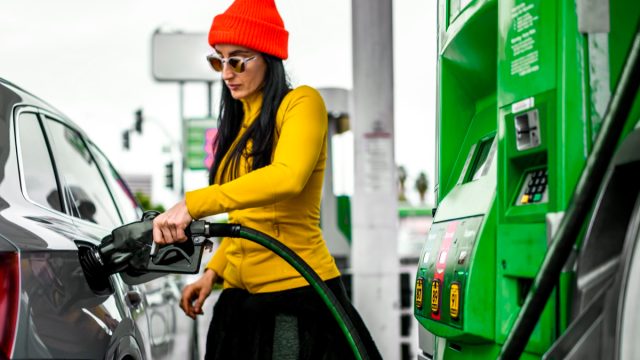
If you’ve stopped by the gas station recently, you know just how expensive gas is getting right now. According to the American Automobile Association (AAA), the highest record for the national cost of gas was hit on March 11, at an average of $4.331 per gallon. It’s still up there now, with the current average of $4.305 per gallon five days later. Amid these skyrocketing prices, the last thing you want to do is let your costly fuel burn too quickly, but there are two common driving habits that could be draining your gas tank. Read on to find out what mistakes you should be avoiding.
RELATED: Don’t Fill Up Your Gas Tank Without Doing This First, Police Now Warn.
You could be causing your car to burn fuel faster by overusing your air conditioning.
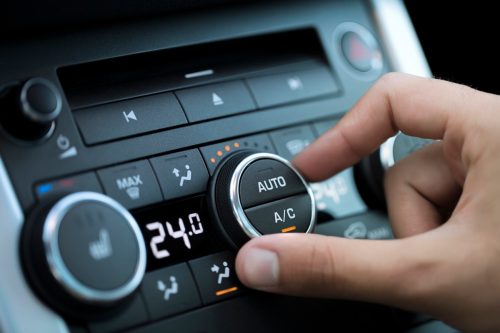
As gas prices continue to climb, the fewer trips you have to take to the gas station, the better. But the distance you’re driving is not the only factor that affects how much fuel your car is using. In fact, experts say there are two common driving habits that could be causing your gas to burn faster than ever. One of these is simply running your air conditioner too much.
While you might be tempted to blast the A/C in your car without a second thought as the days get warmer, AAA warns that doing so could drain your tank faster than you might expect. “Minimize your use of air conditioning,” the association advises. “Even at highway speeds, open windows have less effect on fuel economy than the engine power required to operate the air conditioning compressor.”
Not turning your car off in certain situations can also cause you to lose gas more quickly.
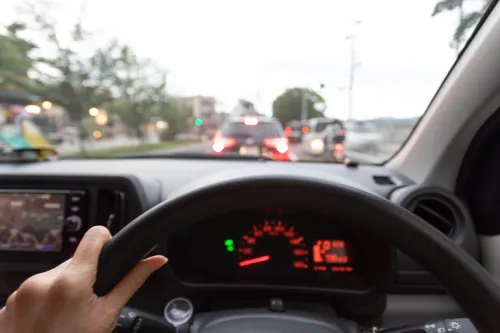
Another way you could be burning through gas too quickly is by keeping your car running longer than necessary—even when you’re driving. “Avoid prolonged idling in general. If your car will be stopped for more than 60 seconds, shut off the engine to save fuel,” AAA suggests. “Many newer cars have automatic engine stop-start systems that do this.”
And if it’s still cold where you live, air conditioning might not end up impacting your fuel, but letting your car run early in the morning to combat the freezing weather could. “Avoid extended idling to warm up the engine, even in winter. It’s unnecessary and wastes fuel,” AAA adds.
RELATED: For more money-saving tips delivered straight to your inbox, sign up for our daily newsletter.
Experts say you should avoid activities that might leave your car idling for too long.
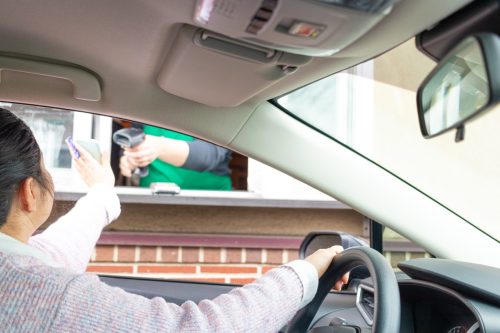
Your car burns about a quarter gallon of gas for every 15 minutes spent idling, AAA says. According to NBC-affiliate WRAL in Raleigh, North Carolina, that means you might need to turn off your car when you’re sitting at a long stoplight, in a carpool line, or even at a drive-thru—as long as it’s safe to do so. After all, sitting in the carpool line for just 30 minutes with your car on could end up costing you half a gallon of gas.
Instead of waiting at a drive-thru, experts advise that you park and go inside the restaurant while gas prices are so high. “Studies have repeatedly shown that personal driving habits are the single biggest factor that affects vehicle fuel consumption. Adopting new and improved driving behaviors … can contribute to significant savings at the gas pump,” AAA says.
You could damage your car trying to save gas in other ways.
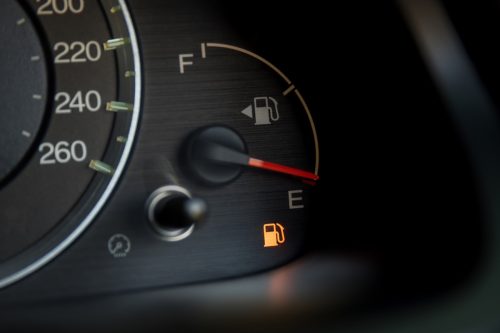
AAA has a number of tips and tricks for trying to help you save as much gas as possible. At the same time, trying to hold out on having to stop by the gas station for a refuel could end up causing problems bigger down the line. David Bennett, the manager of repair systems for AAA, recently told USA Today that drivers should avoid trying to stretch their tank too far.
According to Bennett, you should never let your car get below an eighth of a tank because this actually increases the risk of you damaging your fuel system. Instead, he recommends that people refill once they’re down to a quarter tank just to be safe.
“If you run the gas too low, you have the opportunity to pick up some of that sediment into your fuel system, which could then clog up your fuel filter,” Bennett explained, adding that “it could [also] clog your fuel injectors [which] would cause engine performance problems.”
RELATED: If Your Car Has This, Remove It Immediately, Police Warn.